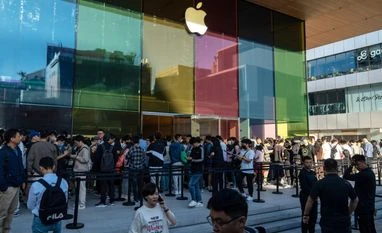By Mark Gurman and Keira Wright
Apple Inc.’s latest iPhones and watches went on sale Friday, a test of whether a new smartphone design and modest smartwatch changes can help return the company to growth.
The devices are going on sale in about 40 countries in its first wave, including in Australia, Hong Kong, mainland China, the US, UK and France. The iPhone 15 Pro and Pro Max models will represent Apple’s biggest sellers throughout the rest of the year — and the ability to both create and fulfill demand for the products will make or break its holiday period.
So far, the new devices have fared well for Apple, based on the initial online sales of the product. New online orders for the highest-end iPhone 15 models won’t arrive for customers until at least mid-November in several countries, while reservations for in-store pickups quickly sold out.
Initial buyers of the latest iPhone typically order it online, making it harder to gauge demand based on the length of lines. Aside from the first two iPhone launches in 2007 and 2008 — as well as the iPhone 5s debut in 2013 — Apple has offered preorders for the iPhone with delivery on launch day.
Still, long lines for the iPhone 15 formed in Dubai, Australia and China, indicating that those who could not secure day one orders online are still willing to brave long nights and early hours to be one of the first to own a new iPhone — and even a new Apple Watch.
China is of particular interest because the government is expanding a ban on iPhone use in certain agencies and state-owned enterprises and rival Huawei Technologies Co. just introduced its highly touted Mate 60 Pro. Still, customers flocked to Apple stores in cities like Beijing as sales began. The China market accounts for about a fifth of Apple’s revenue.
Among the crowd at an Apple store in Sydney was Colin Seton, who has been buying Apple products since the mid-1980s. Seton was waiting in line to purchase the new Series 9 Apple Watch.
“I own most of what Apple sells,” he said, gesturing toward his satchel, containing his AirPods, iPhone, MacBook Air and iPad. “It’s a walled garden, but I don’t mind paying a premium for a product if it’s good.”
Felix Hoffman was waiting in line for a new phone after giving up his old one when he left his job in real estate. Being between jobs didn’t stop him from splurging A$1,849 ($1,184) on the new iPhone 15 Pro. “I just don’t like buying old tech,” he said.
While the iPhone 15 Pro has seen strong early demand, the company’s other new products have gotten more muted response online. The regular iPhone 15 and 15 Plus models, in addition to the new AirPods with a USB-C case, Apple Watch ULTRA 2 and Apple Watch Series 9 are still seeing strong availability, aside from certain Apple Watch band configurations.
The iPhone represents about half of Apple’s overall revenue and the company is banking on the device to help it break a streak of sales declines and return to growth during the critical holiday period, which is its first quarter of fiscal 2024.
With iPhone sales beginning Friday, the company will see about a week of revenue from the latest models within its fourth quarter sales, which it typically reports in late October.
Wall Street is currently expecting Apple to report revenue of about $89.3 billion for the current period, with $43.6 billion of that coming from the iPhone. That would be a decline from last year’s revenue of $90.1 billion, with $42.6 billion coming from the iPhone, during the fourth quarter and would mark its fourth quarterly decline in a row.
But Apple has more reason for optimism over the holiday quarter, which runs from October through December. Sales of iPhones that feature new designs typically spur more upgraders than in years with more minor tweaks. The iPhone 15 Pro’s design marks a significant change with a shift to a titanium design that Apple is focusing on in its marketing.
Apple also likely won’t have to contend with any major supply chain snags that hurt the early sales window for the iPhone 14 Pro and Pro Max last year. Foxconn, the manufacturer of Apple’s highest-end iPhones, was forced to shut its facilities in China for several weeks last year due to the country’s former Covid Zero policies.
In addition, the company has upped the starting price of the iPhone 15 Pro Max this year by $100 after eliminating a smaller storage tier offered in past years. Combined with exclusive features like improved zoom in the camera, this year’s Pro Max model has the opportunity to be a larger-than-usual revenue driver for Apple.













)
